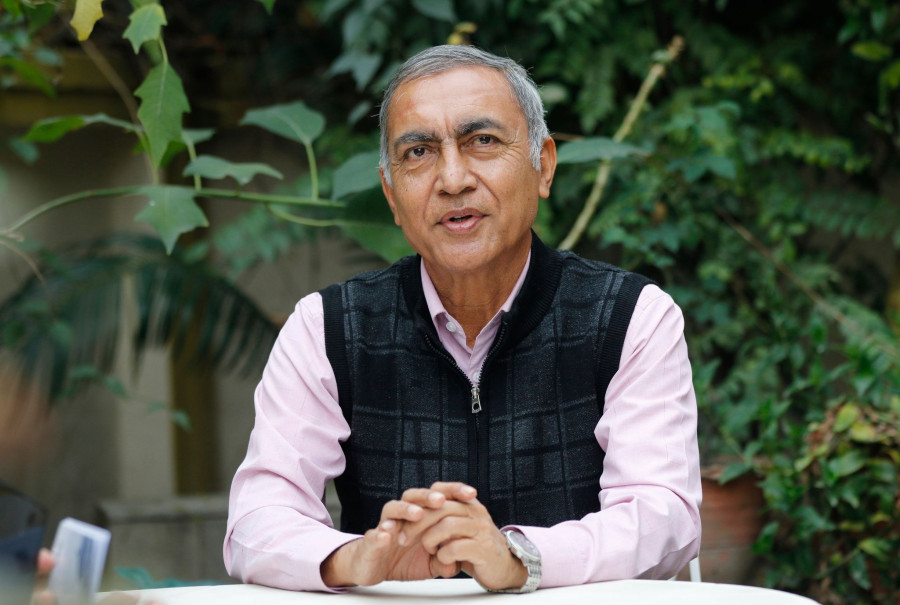Interviews
‘Policy inconsistency has created anarchy in governance’
Former government Secretary Kishore Thapa on how frequent changes in governments and ministers affect the bureaucracy and the impacts of such changes in policies.
Prithivi Man Shrestha
The UML-Maoist Centre coalition broke down after just two months of its formation, in yet another instance of an unusually quick churning in the government that has been a hallmark of post-1990 Nepal. Frequent changes in governments and ministers badly affect the bureaucracy. But how exactly? How does a bureaucrat handle such changes? And what are the impacts of such changes in policies? The Post’s Prithivi Man Shrestha talked to architect and former government Secretary Kishore Thapa. After an illustrious career as a career bureaucrat, Thapa made a foray into politics through the erstwhile Sajha Party when he took part in the 2017 mayoral election for the Kathmandu Metropolitan City. Excerpts:
How do you assess the impact of politics on Nepal’s governance and development over the years?
Nepal has a long history of political instability. After the political change in 1990, Nepali initiated many reforms and the country’s economy also did better in the early 1990s under the Nepali Congress government. After the elections in 1994 that resulted in a hung Parliament, the country started seeing frequent government changes. Since, much of the national energy has been spent in political management.
Political parties failed to implement their own election manifestos when in power. I have not seen any minister make an effort to implement election manifestos of their own parties. The election manifesto should have been a reference document to fulfil the promises that were made to the people before the elections. Since 1994, the country has seen many coalition governments. Such governments are run based on the common minimum programme (CMP). I found no one committed to the CMPs as well.
With frequent government changes, there was also no policy stability. Even under the same government, there are examples of policy inconsistency when a minister is changed. This has created anarchy in governance. So our planning and programming as well as implementation of the development works have suffered.
Could you give examples of political instability resulting in policy instability?
For example, in 2006, the concept of Outer Ring Road in Kathmandu Valley was introduced. I was the first director of that project, working on it for two years. It was one of the key priorities of the interim government after the success of the 2006 people’s movement. But governments formed later did not prioritise this project. If it was the country’s need, subsequent governments should have given it continuity. In the case of Kathmandu-Tarai Fast Track, its implementation modality changed over time, depending on which government was in power. Some governments wanted it implemented under public-private partnership while others wanted the Department of Roads to implement it. Then, its construction was later handed over to the Nepal Army.
You saw how the construction licence of developing the Budhi Gandaki Hydropower Project was awarded to a Chinese company and the next government snatched the licence away. How can a project move forward under such policy inconsistency? Given its unstable policies and untrustworthy rulers, who will risk investing in Nepal?

The national pride projects have been prioritised by all political parties. But they are also facing time and cost overruns. Who is responsible?
On paper, they are highly prioritised projects. But they have no priority in a true sense. Only the ministry under which a national pride project falls is found prioritising the project while other ministries are not so enthusiastic to help with the project’s implementation. Despite highly prioritised projects, government staff and contractors show no commitment to develop these projects.
When you declare a certain project a “national pride project”, all stakeholders should give it special treatment. For example, the procedures for implementing such projects should be shortened. The only special treatment the government has accorded to national pride projects is that they don’t face a resource crunch. That’s not enough. Just like other projects, the national pride projects face problems like difficulties in land acquisition and forest clearance.
Based on your experience, how does the bureaucracy cope with frequent government changes?
The difficulty of government staff is that whenever a new government is formed, it may take up to a month to brief the minister about the activities of the respective ministry depending on the scope of the ministry’s task. While bureaucratic machinery spends time briefing, it cannot give enough time in executing development projects. And the minister is gone by six months after the briefing. Another minister is appointed and the same cycle of briefing continues. I have found that no new minister comes mentally prepared for the job. Some ministers engage in activities like cutting electricity supply to offices that fail to pay bills, which are supposed to be carried out by lower ranked government staff.
Ministers always blame non-cooperation of the bureaucracy for their own failure. How do you see it?
Complaining about non-cooperation from the bureaucracy does not suit a minister. Cooperation also depends on the ability of the minister to take bureaucratic machinery on board. There is also a tendency in the bureaucracy not to follow a minister when they know that the minister will be gone shortly.

How do frequent government changes affect governance?
When their expected stay in government is short, politicians have a tendency to quickly extract as much personal benefit as possible. The ministers bring in bureaucrats who help serve their personal interest. If a minister wants to secure certain benefits from a private enterprise, such a chosen bureaucrat helps the minister prepare a policy that will benefit the enterprise. When the minister has personal interest, the bureaucrat also seeks to benefit personally for serving the minister’s interest.
Another tendency is for the ministers to appoint their own cadres in government entities with the goal of serving their personal or party interests. The new minister does not retain the existing Secretary even though the Secretary has earlier signed a performance contract with the previous minister. A Secretary signs such a contract for a year, after which there is an evaluation. But the new minister transfers the Secretary elsewhere to bring a new one. The new minister not honouring the performance contract the Secretary signed with the previous minister has created anarchy in governance. We cannot expect desired results in such an environment of anarchy.
How is politically aligned government staff hampering the governance?
The bureaucrats aligned with certain political parties have been the biggest obstacle to good governance. The government cannot operate well when the bureaucracy is divided along party lines. The Civil Service Act says there should be only a single trade union of government employees representing bureaucrats. But there are parallel employee unions aligned with different parties. They get a salary from people’s taxes but work in the interest of certain political parties. We cannot expect a government employee aligned with a political party to follow the instructions of a minister from another party. I have also seen government employees work for a certain political faction of a party instead of the whole party.




 13.12°C Kathmandu
13.12°C Kathmandu




.jpg&w=200&height=120)







